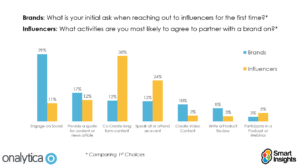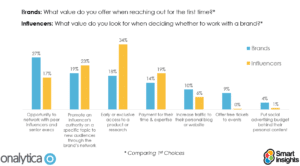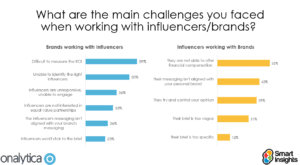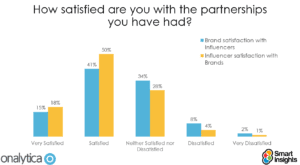At our Influencer Marketing Huddle in November, Alistair Wheate and Dominik Nosalik, from Onalytica talked us through the highlights of their new B2B influencer marketing research. The findings are fascinating…
What outcomes are brands and influencers looking to achieve?
When first looking at this topic many brands automatically assume that influencers are looking for payment and a financial gain. In actual fact, 52% of influencers are looking to be more influential on a certain topic and to grow their authority in that area. In this sense, brands need to realise that influencers are also building up their own personal brand and are wanting a similar outcome to the relationship.
Another top objective for influencers is to ‘get industry insights’. 15% (1 in 7) influencers are keen to benefit from insights, but only 2% of marketers prioritise integrating influencers into research and innovation. This disconnect was summed up by Fintech Influencer Spiros Margaris:
The sooner companies understand the value of influencers for their business, the faster they will win a competitive advantage. Influencers have a good sense of what the next trends might be and, more importantly, an audience that trust them.
Expectations around social media engagement from influencers
Surprisingly, there is also a huge disconnect in engagement on social media between brands and influencers. Many brands target influencers principally because of their large following, or – for the more sophisticated brands – their well-targeted and engaged audiences. This is evidenced by 29% of brands including social media engagement in their ‘initial ask’ to influencers. Yet just 11% of influencers say they are open to providing social engagement for brands.
BUT: It is worth noting here that Onalytica’s audience was primarily B2B, so this data probably does not reflect the large paid advertising industry that has built up around Instagram and YouTube.
What value do brands and influencers look for when partnering?
The graph (below) suggests that influencers and brands both want to ‘promote an influencer’s authority’ on a specific topic to new audiences though the brand’s network. However, they aren’t so aligned on on ‘early or exclusive access to product or research’, which is a priority for 38% of influencers, but only 12% of brands. This is surprising given that many brands could very easily involve influencers in the early dissemination of research and product releases and this would benefit both parties.
9% of marketers persist in offering influencers free tickets to events over other incentives, yet virtually no influencers regard these as important benefits. Many influencers get inundated with free tickets, so it’s not usually an incentive for them and, to those who consider themselves keynote speakers, can feel quite insulting.
Interestingly, only 19% of influencers prioritise payment for their services. This puts payment behind ‘early access to products or research’, ‘promoting the influencer’s authority’ and ‘networking with peer influencers’ in terms of prioritisation. This suggests that, while offering payment may attract a certain type of influencer, most can be motivated without a financial incentive.
What are the main challenges you face when working with influencers/brands?
Somewhat confusingly, given the data above, the #1 challenge cited by influencers is that the brand ‘is not able to offer financial compensation’. This might suggest that influencers are more financially-motivated than they had originally let on. It might also indicate that although most brand/influencer relationships work well, the ones that founder often do so because of financial misalignment.
Influencers also have a problem working with companies that are not ‘aligned with their personal brand’. This suggests that they are receiving requests from companies that, perhaps, haven’t done their homework properly in advance. It also highlights that the ultimate priority of many B2B influencers is really very simple: their own status and brand.
This connects closely to several of the issues highlighted by brands. They often struggle to identify influencers and also to engage with them. This happens when the brand isn’t clear who is should be engaging with, and how to motivate them – which is really down to their lack of experience in running an influencer programme.
How satisfied are brands and influencers in working together?
The research indicates that 56% of brands and 68% of influencers are satisfied or very satisfied with their partnerships. Overall, this suggests the industry is healthy and relationships are positive.
It does, though, leave 44% and 32% that aren’t 100% happy with their influencer marketing partnerships. This may be typical of a relatively new industry in which standards of behaviour and practices on both sides are evolving and best practice is still developing. It will be interesting to see if this figure improves in 2019!
The full report available for download from Onalytica’s website.
In case you weren’t aware, OST manages influencer marketing programmes for brands such as Sage, Thomson Reuters and Salesforce. We are co-hosts of the London Influencer Marketing Huddle and an international centre of expertise on B2B influencer marketing. You can read about our services here.






